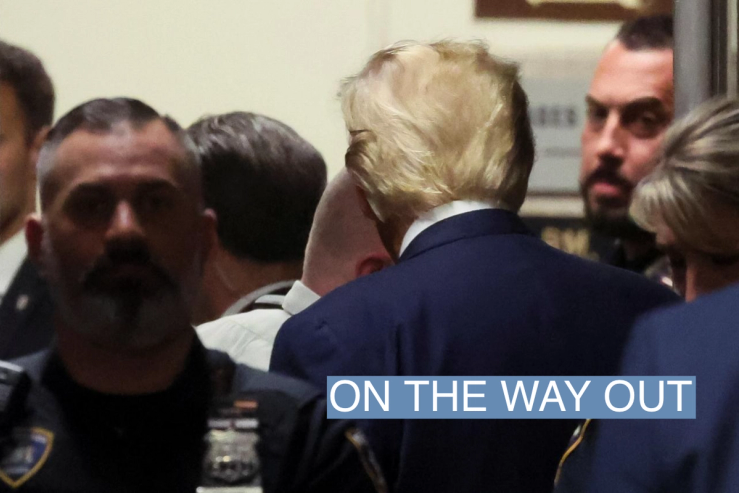The News
The Donald Trump indictment was historic with a capital “H.” News outlets, including Semafor, flooded the zone with coverage of the scene, the politics, and the law surrounding his arrest on Tuesday. There’s been rampant speculation that the charges could reshape the Republican primaries, the general election, and even American democracy itself.
In this article:
Benjy’s view
But I doubt the political world is going to be talking about it for more than a few weeks.
Media spectacles require tinder, sparks, and a constant supply of fresh logs to keep the fire burning. This one doesn’t have it. As the charging documents made clear, almost all of the facts were established by 2018. The next court date is in December, an eternity away, and the actual trial could easily end up delayed.
Nor is this a story that partisans on either side are especially eager to try and force back into the news. There’s a visceral desire among Democrats to see Trump held accountable for his alleged crimes, but almost none of it has been focused on the Stormy Daniels affair. The White House is keeping silent. Left-leaning legal experts in the press are waving their audiences away from what they regard as a weak case — you mostly have to turn to hardcore #Resistance figures like Norm Eisen to find a strong Alvin Bragg defender. Republicans who dislike Trump are apoplectic that the charges keep him in the spotlight. Trump visibly isn’t enjoying it either.
But what about this huge political backlash we keep hearing about? For all the explosive warnings of mass unrest on the right ahead of the indictment, the reaction has been fairly mild. A CNN poll found only 25% of respondents “strongly disapprove” of the charges, an unusual “meh” for a figure who is practically synonymous with extreme polarization. Other polls have found most Americans are willing to buy that the charges are partly motivated by politics — but also unperturbed to see them brought against Trump.
Opinions could change, but Nate Silver’s prediction that voters would treat the indictment as a “Lifetime Achievement Award” for someone who had it coming, rather than a slippery slope to a banana republic, has been the best frame for understanding the reaction so far. This is bearing out in the real world as well: Few people showed up at the Manhattan courthouse on Tuesday, nor were there mass protests elsewhere. Conservative voters failed to turn out in a high-profile Wisconsin judicial race the same day, leaving progressives to win in a romp.
Finally, there’s the strong possibility the indictment is superseded by a second, third, or, even fourth arrest tied to the infinitely more high-stakes investigations into Trump’s handling of classified documents (where recent reports are grave for him), his efforts to overturn the election, and his role in January 6th, all of which tap directly into the beating heart of partisanship around Trump. If even one of them hits, whatever happens in the Bragg case will become an afterthought.
Room for Disagreement
While my suspicion is that there will be plenty of fresher news cycles to discuss by the first Republican debate, there’s no shortage of conservative and liberal pundits predicting that the indictment could be game over for Ron DeSantis and other GOP hopefuls’ attempts to win the nomination. New York Magazine’s Eric Levitz lays out an especially strong case: “No Republican wants to be seen as making the implicit argument that ‘the vast left-wing conspiracy against Trump has succeeded in poisoning his image with swing voters, so we just need to defer to the woke mob on this one and nominate someone else.’ To associate yourself with such reasoning would be to declare your unfitness for holy war with the liberal establishment.” Politico notes that Trump received a polling bump with Republican primary voters ahead of his arrest, but it’s unclear how long it might last.
Notable
- Writing in The Atlantic, Tom Nichols also notes the lack of widespread public reaction to Trump’s arrest, but worries about its effect on disturbed individuals or fringe groups: “When extremists and conspiracy theorists feel the tide turning against them, when they think they’ve lost and the country is no longer fascinated by their flaky claims, they will sometimes lash out with violence.”


